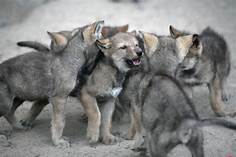Can You Get a Wolf as a Pet?
Wolves are fascinating creatures that have captivated humans for centuries. Their intelligence, loyalty, and majestic appearance make them seem like ideal companions. However, keeping a wolf as a pet is not as straightforward as it may seem. In this article, we will explore the pros and cons of owning a wolf as a pet and provide you with essential information to help you make an informed decision.

Wolf Ownership Laws: A Complex Maze
The legality of owning a wolf as a pet varies widely across different countries and states. In some areas, it is illegal to keep wolves in captivity, while others may have specific regulations and permits required for ownership. It is crucial to research and understand the laws in your region before considering wolf ownership to avoid legal complications.
Even in areas where wolf ownership is permitted, there may be strict regulations regarding the care, handling, and housing of these animals. These regulations are designed to ensure the safety of both the animal and the public. It is essential to familiarize yourself with these regulations and ensure you can meet them adequately.
The Challenges of Wolf Ownership: A Test of Strength
Wolves are not domesticated animals like dogs, and owning one comes with unique challenges. They have distinct behavioral traits and require specialized care and training to thrive in a domestic setting.
Wolf puppies are adorable and playful, but they quickly grow into powerful and potentially dangerous animals. They require extensive socialization and training from an early age to become accustomed to human interaction and commands. Without proper training, wolves can exhibit destructive behaviors, aggression, and be a danger to themselves and others.
Additionally, wolves have specific dietary and exercise needs. They require a diet high in meat and bones, and they need a lot of space to roam and explore. Providing a suitable environment for a wolf can be expensive and time-consuming.
The Drawbacks of Wolf Ownership: A Candid Perspective
There are several drawbacks to owning a wolf as a pet that potential owners should carefully consider.
Wolves are not inherently affectionate animals like dogs. They may form bonds with their owners, but their affection is often more reserved and less demonstrative. This can be a disappointment for those seeking a cuddly and loving companion.
Wolves can be destructive and cause significant damage to property. They may chew on furniture, dig holes in the yard, and even escape from enclosures if not properly secured. This can lead to costly repairs and frustration.
Owning a wolf can also be isolating. Many people are afraid of wolves, and this can make it difficult to find suitable housing, pet-friendly parks, and veterinary care. Additionally, the legal restrictions and stigma associated with wolf ownership can make it challenging to socialize with other pet owners.
The Verdict: A Matter of Responsibility and Awareness
Ultimately, the decision of whether or not to get a wolf as a pet is a personal one. However, it is crucial to approach this decision with a clear understanding of the challenges, drawbacks, and legal implications involved. Wolves are not suitable pets for everyone, and it is essential to carefully consider your lifestyle, experience, and resources before bringing one into your home.
If you are still determined to own a wolf, it is imperative to conduct extensive research, connect with reputable breeders or rescue organizations, and work with experienced trainers and veterinarians to ensure you can provide the best possible care for your wolf companion.
Declaration: All article resources on this website, unless otherwise specified or labeled, are collected from online resources. If the content on this website infringes on the legitimate rights and interests of the original author, you can contact this website to delete it.



